| Srl | Item |
| 1 |
ID:
103850
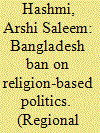

|
|
|
| 2 |
ID:
135575
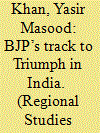

|
|
|
|
|
| Summary/Abstract |
The political landscape of India witnessed a historical about-turn when the Bharatiya Janta Party (BJP) decisively ended the decade-long political monopoly of the Indian National Congress (INC). it goes without saying that the unprecedented victory of the BJP in the recent elections has out-distanced even its own major success of 1998. No doubt, there are a number of crucial factors which paved the way for its resounding success. one of course, is the political and ideological vacuum created by the rival INC. this said, however, this paper seeks to uncover other distinct and multifaceted factors which led to the overwhelming rise of the tide of Hindutva, and this despite the fact that India is touted as being a secular and pluralistic democratic state.
|
|
|
|
|
|
|
|
|
|
|
|
|
|
|
|
| 3 |
ID:
079532
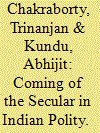

|
|
|
|
|
| Publication |
2007.
|
| Summary/Abstract |
Instead of searching for a definitive connotation of what is 'secular', the present essay explores how secular concepts gradually arrived on the scene of the Indian polity from a variety of areas and re-examines possibilities of probing the place of the secular in Indian polity by problematising its practice over time. Our methodology involves a shift of focus in searching for the roots of this concept in local and peripheral arenas rather than central texts and events. The dynamics of Indian centre-periphery relations have been dominantly historicised by the struggle for independence. This essay highlights the relevance of peripheral texts in defining secular aspects of polity, examining the dominant texts of the centre from the vantage point of the margin. While documenting an alternative discursive construction of secular politics in India, a sociologically informed reading on the question of 'the secular' argues that it will never dominate Indian politics without multiple challenges
|
|
|
|
|
|
|
|
|
|
|
|
|
|
|
|
| 4 |
ID:
097962
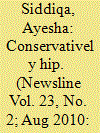

|
|
|
| 5 |
ID:
116892


|
|
|
|
|
| Publication |
2012.
|
| Summary/Abstract |
It has become common to regard consociational democracy as a method of managing conflict in ethnically divided societies but little attention has been paid to its applicability to societies where the primary political cleavage is between secular and religious forces. This article seeks to redress this imbalance by examining the applicability of consociationalism to the case of the Palestinian Territory. We argue that, while Palestinian society is characterised by 'pillarisation' along a secularist/Islamist cleavage, formal power-sharing between the representatives of the two main Palestinian factions, namely Fatah and Hamas, has proved elusive. However, rather than seeking to explain the seeming inability of the factions to share power by reference to the nature of the cleavage, as other authors have done, we instead highlight the contextual factors that have made power sharing difficult to achieve, namely the difficulties Hamas and Fatah face in accepting each other as political partners, and opposition from external actors.
|
|
|
|
|
|
|
|
|
|
|
|
|
|
|
|
| 6 |
ID:
106108
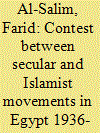

|
|
|
| 7 |
ID:
174360
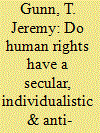

|
|
|
| 8 |
ID:
154496


|
|
|
|
|
| Summary/Abstract |
This article discusses the depiction of the exodus myth in advertisements in Israeli secular and religious daily newspapers from 1948 to 2008. Its premise is that advertising as a persuasive communication tool adapts itself to its target audience. As a result, there are notable differences in the use of the myth in advertisements targeting various audiences. A total of 1907 advertisements were examined with the use of quantitative content analysis. The research premise was extensively substantiated and can point to the differential perception of the exodus myth among Israel’s secular and religious populations.
|
|
|
|
|
|
|
|
|
|
|
|
|
|
|
|
| 9 |
ID:
106087
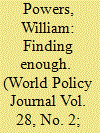

|
|
|
| 10 |
ID:
140380
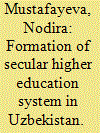

|
|
|
| 11 |
ID:
111158
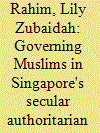

|
|
|
|
|
| Publication |
2012.
|
| Summary/Abstract |
The governance of Muslims in Singapore has been strongly shaped by the secular authoritarian state's commanding influence over Islamic institutions, such as the main religious bureaucracy Majlis Ugama Islam Singapura (the Islamic Religious Council), and reliance on draconian legislation, such as the Maintenance of Religious Harmony Act (MRHA), the Sedition Act and the Internal Security Act. Inter alia, these laws attempt to inoculate religion against politics, regulate religious activity and restrain the development of an autonomous Muslim civil society. The contradictions associated with the MRHA and no-tudung ('headscarf') policy are analysed within the framework of the authoritarian state's assertive secularism. The significance of localised socio-economic and political grievances in motivating a small number of Singaporean Muslims in supporting radical Islamist ideology is also considered.
|
|
|
|
|
|
|
|
|
|
|
|
|
|
|
|
| 12 |
ID:
105028
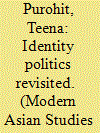

|
|
|
|
|
| Publication |
2011.
|
| Summary/Abstract |
This paper analyzes the political project of secular Islam as outlined by the Indian political and religious leader, Muhammad Shah-also known as Aga Khan III (1877-1957). As first president of the All India Muslim League, Muhammad Shah facilitated the installation of separate electorates for Muslims as well as the call for Partition. The reformist notion of Islam he invoked for this separatist programme was informed by the secular and modernizing projects of the colonial public sphere. Simultaneously, however, Muhammad Shah claimed a divine role as Imam of the Ismaili Muslim community-a position validated by Ismaili beliefs and teachings of messianic Islam. The paper engages Muhammad Shah's writings and the devotional texts of the Ismailis to illustrate how the heterogeneous forms of practices peculiar to the vernacular history of Islam in early modern South Asia were displaced by the discourse of religious identity in the colonial period.
|
|
|
|
|
|
|
|
|
|
|
|
|
|
|
|
| 13 |
ID:
092292
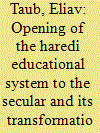

|
|
|
| 14 |
ID:
117462
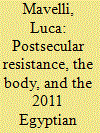

|
|
|
|
|
| Publication |
2012.
|
| Summary/Abstract |
At the heart of the notion of the postsecular is an implied and largely under-theorised idea of resistance against the pathologies of modern secular formations. This is most notably exemplified by Jürgen Habermas's highly influential approach which argues that these pathologies can be resisted through a cooperative cognitive effort of secular and religious consciousnesses. This article contends that this understanding overlooks more embodied forms of resistance to the effect that it curtails our capacity to conceptualise postsecular resistance in international relations. Following a contextualisation of Habermas's approach in the broader Kantian tradition to which it belongs, the article develops a contending Foucauldian reading of the body as a locus of resistance and uses this framework to analyse some of the events leading to the 2011 Egyptian revolution. The focus is on the publication of images and videos of police abuses by Egyptian bloggers and independent media as a practice of resistance to the widespread and systematic use of torture. The emotional response to these images, it will be argued, contributed to unite Egyptians despite longstanding fractures, most notably that between secularists and Islamists, thus turning the body from an 'inscribed surface of events' into a postsecular locus of resistance. The article concludes by highlighting the main implications of this analysis for future research agendas on the postsecular in international relations.
|
|
|
|
|
|
|
|
|
|
|
|
|
|
|
|
| 15 |
ID:
151865


|
|
|
|
|
| Summary/Abstract |
In 1819, the American Board of Commissioners for Foreign Missions (ABCFM) began a mission in the Middle East. Though initially the missionaries sought to convert Muslims and Jews to the Christian faith, they soon turned to revitalizing their co-religionists. This puzzling situation of Christians proselytizing other Christians occurred because the two groups of Christians, American and Middle Eastern, held very different cultural and political notions of what that identity meant. In the end, the American mission remained minimally effective at conversion but influential in its secular goals of educating, furthering religious freedom, and modernization. Counter-intuitively, the missionaries’ religious proselytizing became implicated in a kind of secularization.
|
|
|
|
|
|
|
|
|
|
|
|
|
|
|
|
| 16 |
ID:
142108
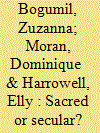

|
|
|
|
|
| Summary/Abstract |
The reconstruction of the history from the late 1980s to the mid-1990s of Soviet repressions critically influenced the social formation of Gulag memory in Russia. Amongst those re-narrating the past, the ‘Memorial’ Society and the Russian Orthodox Church most actively shaped the collective memory of Soviet repressions, trying to establish multi-layered explanatory constructs of the Gulag. Their interpretations were crystallised through contemporary memorialisation acts in significant landscapes of the past. Focusing on Solovki, Ekaterinburg, Butovo and Magadan, and analysing tensions in their memorialisation processes, we discuss secular and Orthodox interpretations of the Gulag, and their impact on the memory of the Soviet repressions in contemporary Russia.
|
|
|
|
|
|
|
|
|
|
|
|
|
|
|
|
| 17 |
ID:
084516
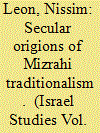

|
|
|
| 18 |
ID:
103405


|
|
|
| 19 |
ID:
096911


|
|
|
| 20 |
ID:
116796
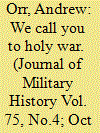

|
|
|
|
|
| Publication |
2011.
|
| Summary/Abstract |
In the immediate aftermath of the First World War, Mustafa Kemal and his Turkish National Movement fought to create a Turkish nation-state in the face of Allied attempts to partition the Turkish regions of the former Ottoman Empire. The struggle over the future of Turkey overlapped with the civil war which came on the heels of the Bolshevik Revolution in neighboring Russia and the assumption of control over nearby parts of the Middle East by Britain and France. Believing that events in Turkey were bound to have an impact on its attempt to consolidate control over its new imperial holdings in the Near East, the French government made a concerted effort to come to grips with the nature of the Kemalist movement. In the process, however, France's military intelligence analysts, instead of seeing Kemalism as the nationalist and secular, westernizing movement it was, chose to identify Kemal as the central figure in a communist-inspired, German-controlled anti-colonial enterprise closely allied to Islamist political movements. The French military's misunderstanding of Kemal's goals and ideology reflected intelligence officers' belief that Middle Eastern developments were essentially derivative of European politics.
|
|
|
|
|
|
|
|
|
|
|
|
|
|
|
|